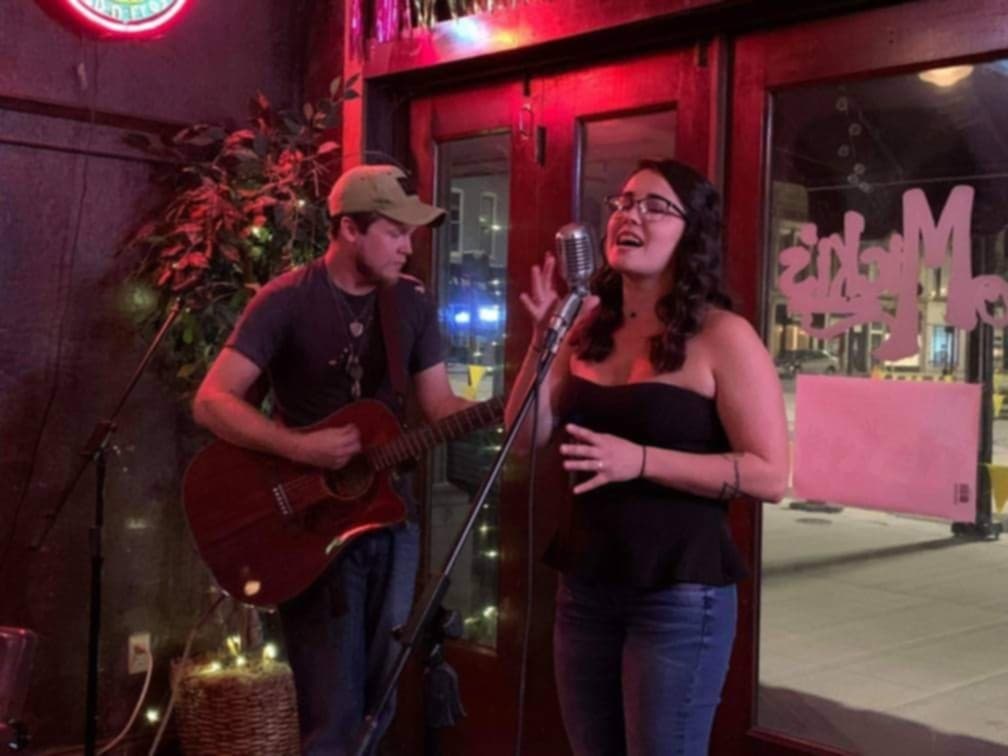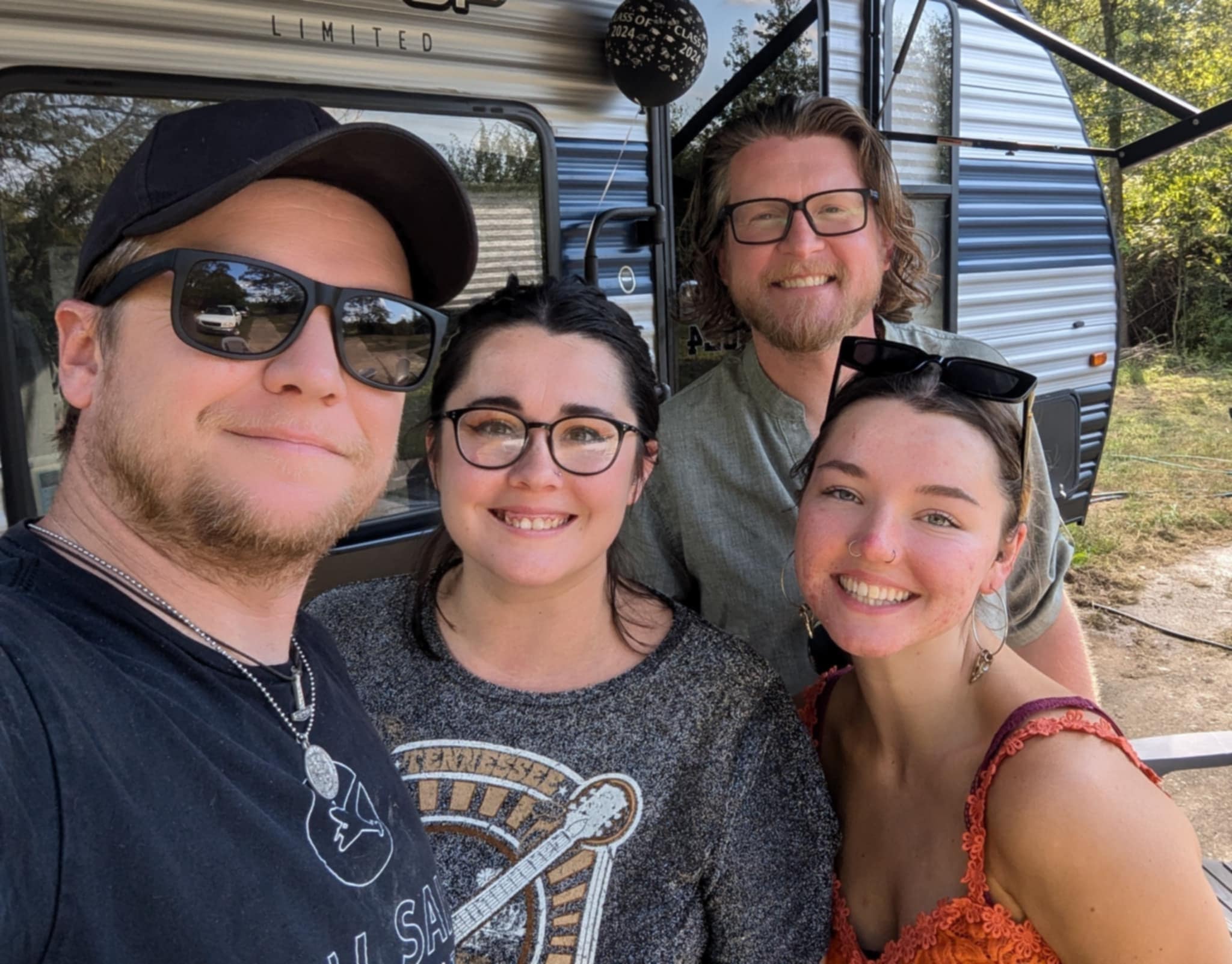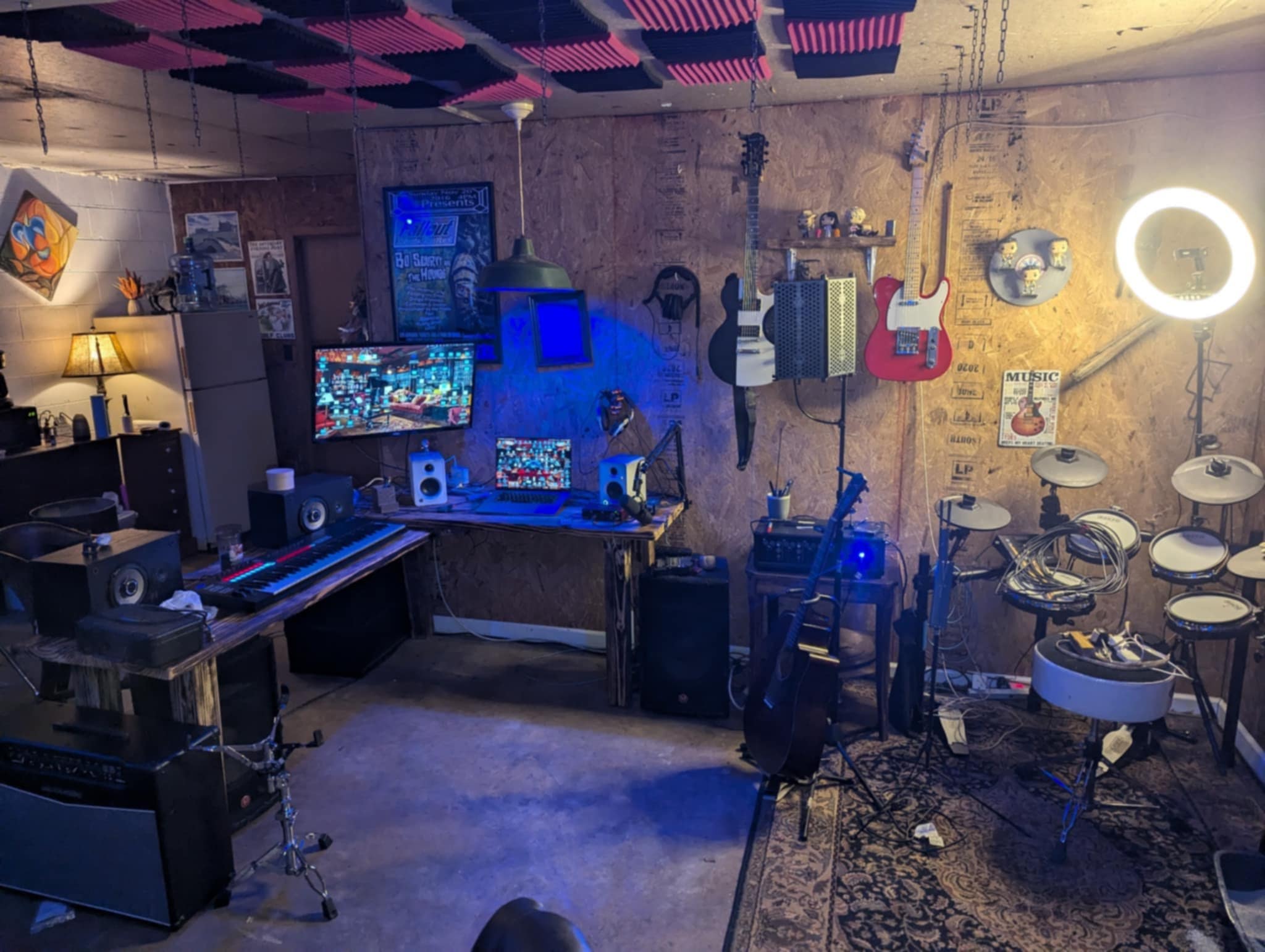We were lucky to catch up with Jesse Francis recently and have shared our conversation below.
Jesse, thanks for taking the time to share your stories with us today Can you take us back in time to the first dollar you earned as a creative – how did it happen? What’s the story?
The first dollar I made with my music was dropped into an open guitar case outside of Tucson Coffee Roaster. I was 28 years old and had never played guitar or sung in front of anyone I didn’t know personally. As a super shy, introverted person, the idea of performing for strangers was terrifying. But I had always loved music with a passion, and my friends and family constantly told me I was good. By that point, I had been playing guitar and singing for 12 years—but always in a controlled setting.
Then one day, I felt the urge to see what would happen if I played in public. After talking with the owner of Tucson Coffee Roasters, Ian Victors, he graciously allowed me to come out that Saturday morning—just three short days away. I must have practiced my “set list” a thousand times, imagining a flawless performance that would blow away anyone within earshot.
After a sleepless night of anxiety-driven barrel rolls in bed, the day had arrived. I packed up my guitar and headed to the coffee shop, where my new life of fame and stardom was about to begin—or so I thought. My best friend Scott met me there to help move a couple of tables and cheer me on for the next hour… or so he thought.
Playing in public is rough, and I made a bunch of mistakes right off the bat.
Mistake #1: I grabbed a chair. Scott suggested I stand for my grand debut, but since I had only ever played sitting down, that felt safer.
Mistake #2: I took my guitar out of its case, folded up the case, and tucked it behind a table—unintentionally eliminating the “tip jar” factor.
Mistake #3: I had never practiced with a guitar pick. And there I was, outside a coffee shop, with no mic, trying to battle foot traffic and passing cars for volume.
I started playing, but I could feel how quiet I was. Every few minutes, I’d glance at Scott for reassurance, and he’d signal that he couldn’t hear me. People passed by with polite smiles, and a few stopped for a moment before continuing with their day.
Halfway through my set, Scott dug my guitar case out from behind the table, opened it, and placed it in front of me. After my song ended, he leaned in and said, “They had cash in their hand for you, but there was nowhere to put it, so they just put it back in their pocket and left.”
My first dollar as a live musician had just walked away.
I finished my hour-long set battling the same struggles—volume, lack of crowd banter, and an overwhelming feeling of doom if I messed up even one note. Looking back, I have no idea why that mattered so much, considering people could barely hear me play the right notes all the other times.
Finally, I hit the last chord, let out a massive sigh of relief, and glanced into my guitar case. Boom—money. Three singles sat on the black backdrop.
I counted them multiple times, pocketed my earnings, and packed up. When I went inside to thank Ian for the opportunity, he simply asked, “You wanna come back next week?”
“Hell yes!”
Clearly, I was no rock god. As Scott and I debriefed afterward, he kindly suggested that I practice singing and playing while standing. He then compared my seated performance to a dying spider holding a guitar—bent funny, twisted up, and visibly anxious. I joked the chair was the only thing keeping up from the crushing anxiety, but I agreed: next week, I’d be standing. My guitar case would be out where people could see it. And I’d bring a guitar pick.
Get yourself a friend like Scott—someone who pushes you, supports you, and isn’t afraid to roast you along the way.

Jesse, love having you share your insights with us. Before we ask you more questions, maybe you can take a moment to introduce yourself to our readers who might have missed our earlier conversations?
My name is Jesse Francis, and I’ve been playing music for about 25 years. I was born in Tucson, AZ, on Davis-Monthan Air Force Base but moved around a lot—spending my early years in Birmingham, AL, before heading to Bowling Green, KY, for high school. Music has been a constant in my life, from drumline in high school, where I played center snare in a 21-member line, to picking up acoustic guitar as a freshman with no guidance—just pure curiosity and passion.
Music was always around me. My older brother, David, was my biggest inspiration. He played bass and tuba, locking himself away for hours to learn by ear, and he seemed like a music god to me. Watching him rock out in pep band made me want to learn guitar and drums—it just felt right.
But as much as I loved music, I was also an introverted kid. I never went to summer camp, got homesick at sleepovers, and always felt a pull to be home. That all changed when I joined the military in 2006, following in my brother’s footsteps. I spent six years in the Air Force, including two tours in Afghanistan, traveling all over the world—and through it all, I always made sure I had a guitar with me.
During my service, I taught myself how to play and sing at the same time, which became the foundation for my next chapter. After the military, I bounced around between odd jobs, always playing music in my free time. That led to me playing acoustic gigs in Tucson under the name “Bo Scurvy” and eventually forming Bo Scurvy & The Hounds, a blues-rock duo that Tucson didn’t know it needed (or wanted, honestly). Tucson was mostly about hip-hop and country, but we found our niche, won a Battle of the Bands in 2016, and kept pushing forward.
Somewhere along the way, I auditioned for American Idol and even made it past the first round—but I backed out. I realized I didn’t want to be a karaoke singer. That moment, though, showed me that I had something real. I could actually make music work.
Hitting the Road & Finding My Sound
In 2019, I decided to pack up and travel. With my guitar, my blue heeler Dany, and a desire to see what was out there, I set off in a Jeep Patriot with a teardrop camper. Right before leaving, I met Savannah, who shared my love for music and adventure. She downsized her life, kicked Dany into the backseat, and we hit the road.
We traveled the backroads, played small gigs as a duo, and screamed our favorite songs out the window. We slept in Walmart parking lots, truck stops, BLM land campsites, and the driveways of generous friends. Everything felt perfect.
Then COVID hit.
We were actually camping at the Grand Canyon when the world shut down. After two weeks there, we packed up and headed for the exit—only to find the gates locked. Three park rangers eventually showed up, and while one of them tried to flex about arresting us for being outside our home, the others just rolled their eyes. After some back and forth, we were on our way.
With nowhere else to go, we headed to Alabama, where my grandparents own 10 acres of land in the middle of nowhere. That’s where I decided to build a tiny house and set up a small music space in an old cinder block building that once held chicken eggs before going to market.
During this time, my brother David kept nudging me to enroll at Full Sail University. He had been studying audio engineering, and he knew I could benefit from it, too. After about a year of convincing, I took the leap and enrolled in their online Music Production program.
For two and a half years, I lived off-grid, grinding through intense coursework, writing music, and learning theory—all in a home studio with zero climate control. It was one of the best decisions I ever made.
I graduated second in my class, and now, I have the tools, knowledge, and experience to do it all.
What I Do & What Sets Me Apart
Today, I work as a music producer, composer, and sound designer. I’m currently:
Producing a country album, playing all the parts and recording everything myself.
Writing cinematic and video game music as part of a music-writing group.
Helping indie creators find the perfect sound for their projects.
What sets me apart? I know how music should feel. When I was a kid, my family had eight milk crates full of classical music CDs, and I would listen to them constantly. That deep connection to music shaped how I approach composition today. I understand how music enhances storytelling, whether it’s in a song, a game, or a film.
I also know what it’s like to start from nothing—to build something out of passion and persistence. I’ve performed for nobody, for small crowds, for competition judges, for packed rooms—and each time, I’ve learned something new.
What I Want People to Know
Music has been my companion through every chapter of my life. Whether it was playing snare in high school, strumming a guitar in Afghanistan, screaming lyrics on road trips, or producing in a tiny off-grid studio, music has always been there.
Now, I want to create music that resonates with others. I want to help indie game developers, filmmakers, and musicians bring their ideas to life with music that tells a story and evokes emotion.

What’s the most rewarding aspect of being a creative in your experience?
For me, the most rewarding aspect of being an artist has evolved over time. Early on, the biggest thrill came from the sheer surprise on people’s faces when I first played guitar and sang in front of them. It was almost like proving to myself and others that I could do it. But as I’ve grown as a musician, it’s become less about the ability itself and more about the impact of the work.
Now, the real reward comes from answering bigger questions: Is the song relatable? Is it meaningful? Can someone dance to it? Does it help tell a story? Being able to deliver on those things carries far more weight than just hearing, “I didn’t know you could sing like that.”
I think most musicians just want their music to be heard—to know that their art resonates with someone. So when I see a listener connect with a song I wrote, when they relate to the words or feel something in the music, that’s the moment that makes it all worth it.

Are there any resources you wish you knew about earlier in your creative journey?
This is kind of a trick question for me. There are definitely resources I wish I had known about earlier, but at the same time, not having them forced me to grow in ways that ultimately made me a better musician.
The first thing that comes to mind is MIDI and virtual instruments. Now, having the ability to lay down a drum pattern with just a few clicks is amazing and makes songwriting so much more efficient. But early on, not having that option forced me to actually learn the drums—which means my drum patterns now have more of a real drummer’s feel, something I might have missed out on had I relied on MIDI too soon.
Another big one is Full Sail University. I started my music production degree when I was 34, and sometimes I kick myself for not going sooner. I think about where I’d be now if I had gained this knowledge earlier. But at the same time, I wasn’t the best student in high school, and if I had gone to Full Sail right away, I don’t think I would have done as well. I needed life experience first.
And then there’s Logic Pro, my now-preferred DAW. Having access to it earlier might have sped up my workflow, but learning production the way I did—through trial and error, live performances, and hands-on experience—shaped me into the musician I am today.
So while things like MIDI, Full Sail, and Logic Pro could have helped me earlier, learning at my own pace, in my own time, was exactly what I needed.
Contact Info:
- Website: https://catlapstudio.wixsite.com/cat-lap-studio-1
- Instagram: https://www.instagram.com/boscurvy/
- Facebook: https://www.facebook.com/CatLapStudio/
- Linkedin: https://www.linkedin.com/in/jesse-francis-3a16a5216/
- Youtube: https://www.youtube.com/@CatLapStudio



